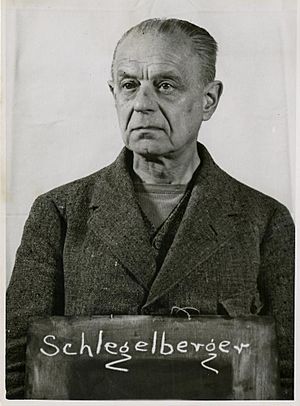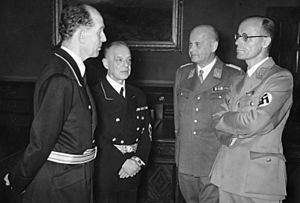Franz Schlegelberger facts for kids
Quick facts for kids
Franz Schlegelberger
|
|
|---|---|

Schlegelberger (aged 71) at the Nuremberg Judges' Trial
|
|
| Reich Minister of Justice | |
| In office 30 January 1941 – 20 August 1942 |
|
| President | Adolf Hitler (as Führer) |
| Chancellor | Adolf Hitler |
| Preceded by | Franz Gürtner |
| Succeeded by | Otto Georg Thierack |
| Personal details | |
| Born | 23 October 1876 Königsberg, Province of East Prussia, German Empire |
| Died | 14 December 1970 (aged 94) Flensburg, Schleswig-Holstein, West Germany |
| Nationality | German |
| Political party | Nazi |
Franz Schlegelberger (born October 23, 1876 – died December 14, 1970) was a German lawyer and politician. He served as a high-ranking official in Germany's Ministry of Justice. Later, he became the acting Justice Minister during the time of Nazi Germany. He was one of the most important people put on trial at the Judges' Trial in Nuremberg after World War II.
Contents
Franz Schlegelberger's Early Life and Career
Schlegelberger was born in Königsberg, a city in what was then East Prussia. His family was Protestant, and his father was a salesman. He studied law at the University of Königsberg and earned his law degree in 1899.
After finishing his studies, Schlegelberger started his career in the legal system. In 1901, he became a court assessor, which is a type of legal assistant, in Königsberg. By 1904, he was a judge. He moved to Berlin in 1908 and continued to work his way up in the legal system. He became a council member at the Berlin Court of Appeals in 1914.
In 1918, Schlegelberger joined the Reich Justice Office, which was Germany's main justice department. He continued to rise through the ranks, becoming a Ministerial Director in 1927. This meant he held a very important position in the Ministry of Justice. He also taught law as a professor at the University of Berlin. In 1931, he became the State Secretary in the Ministry of Justice. This was a key role, working directly under the Justice Minister. In 1938, he joined the Nazi Party as ordered by Adolf Hitler.
His Role in Nazi Germany

During his time in the Ministry of Justice, Schlegelberger worked on various legal projects. One of his tasks was to help create a new national currency. This was meant to stop the very high inflation that was affecting the German currency, the Reichsmark.
After the death of the Justice Minister, Franz Gürtner, in 1941, Schlegelberger took over as the acting Reich Minister of Justice. He held this position until 1942. During his time as minister, the number of death sentences in Germany increased greatly. He also helped create harsh laws, such as the "Poland Penal Law Provision." This law meant that Polish people could be executed for minor offenses, like tearing down German posters.
When he retired from his position in 1942, Adolf Hitler gave Schlegelberger a large sum of money, about 100,000 Reichsmarks. In 1944, Hitler even allowed him to buy an estate with this money. This special treatment showed that Hitler thought highly of Schlegelberger. This fact was later used against him in his trial.
The Nuremberg Trial and Later Life
After World War II, Franz Schlegelberger was one of the main people put on trial at the Nuremberg Judges' Trial. This trial focused on judges and lawyers who had helped the Nazi regime. He was found guilty of being involved in war crimes and crimes against humanity.
In 1947, Schlegelberger was sentenced to life in prison. However, in 1950, when he was 74 years old, he was released from prison. This was because of his poor health. After his release, he received a monthly pension. He lived in the city of Flensburg until he passed away on December 14, 1970.
See also
 In Spanish: Franz Schlegelberger para niños
In Spanish: Franz Schlegelberger para niños
 | Precious Adams |
 | Lauren Anderson |
 | Janet Collins |

